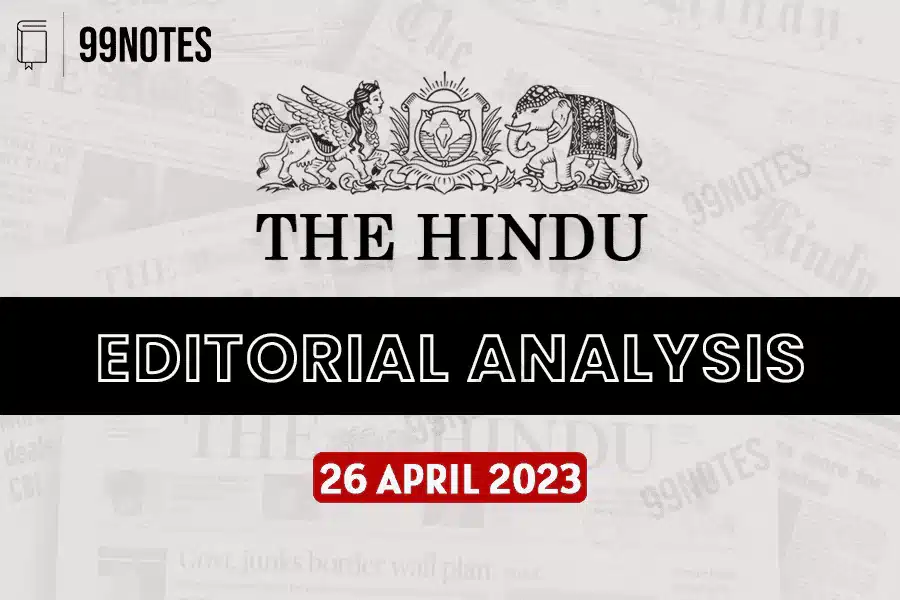26 April 2023 : The Hindu Editorial
India’s “Operation Kaveri” to evacuate Indians stranded in war-torn Sudan.
Syllabus Tags: GS 3: Disaster Management; GS 2: International Relations.
Context: India’s “Operation Kaveri” is underway to evacuate Indians stuck in war-torn Sudan.
- The operation involves the Indian Air Force and the Indian Navy and is coordinated by the Ministry of External Affairs.
- India is coordinating efforts with other countries, such as the U.S., the U.K., the UAE and Saudi Arabia, for logistics and timing of the evacuation operations.
Challenges in Evacuation:
- The evacuation highlights the challenges India faces in any conflict, given its large non-resident population and tourists in dangerous environments.
- The government should consider a standard operating procedure and a special force to deal with such crises, as the Parliamentary Standing Committee for External Affairs recommended in 2022.
- It is essential to avoid political grandstanding or finger-pointing and focus on rescuing needy citizens.
Why there is a Need for a proper evacuation policy for India.
- India has been involved in multiple rescue operations worldwide in countries such as South Sudan, Ukraine, Yemen, Libya, Kuwait etc.
- Huge Indian Diaspora: approximately more than 11 million Indians residing abroad. According to the world migration report 2022, India has the largest Diaspora in the world.
- Many of these Indian citizens, non-resident Indians, reside in conflict-ridden countries of Africa, Southeast Asia and Europe. Hence it becomes the duty of the Indian government to ensure their safety during conflicting times and rescue them.
- With the growing Indian population and increasing migration – this Indian Diaspora is only expected to increase in the coming decades.
- Complexities in evacuation: evacuation of Indian citizens from war-torn countries is strenuous. It involves working on multiple platforms, including political negotiations, provision for evacuation vehicles, financial requirements, geographical limitations etc.
However, in the absence of any standard operating procedure or formal doctrine, dealing with such situations is challenging as it increases ambiguities in operation and public scrutiny.
Way forward:
- Significant military and diplomatic resources should be implemented to assess and efficiently use available resources.
- Developing standard operating procedures or a formal doctrine or emergency plan is necessary.
- Special training should be given to Indian diplomats to deal with such hostile conditions.
- Taking a cue from other countries: for example, we can learn from Brazil’s national defence policy, which includes the protection of Brazilian citizens living outside the country. Several European countries also have formal education policies in place.
- Agreements with countries: the government can coordinate with other countries to facilitate better communication and increase the effectiveness of evacuation operations.
- Special air/naval fleets should be prepared to undertake such evacuation operations.
- Applications of modern technology: Drone surveying and modern communication facilities should be used to identify, monitor and establish contact with citizens residing abroad.
Conclusion
- It is pertinent that government value their citizens who reside abroad and act to ensure their safety in emergencies.
- Risks to migrants include violent conflicts, political unrest, natural disasters, being targeted by extremist movements etc.
- Hence the government should be apt enough to act immediately and effectively to protect the lives and property of all Indians residing abroad.
Sanskrit is an official language, Ambedkar’s amendment.
Syllabus Tags: GS 1: Society; GS 2: Consitution
Context:
- According to Justice G.R. Swaminathan of Madras High Court – B.R. Ambedkar had expressed his desire to make Sanskrit the official language of the Indian Union.
- During the Constituent Assembly proceedings, B.R. Ambedkar proposed an amendment that suggested Sanskrit be declared as the official language of the Indian Union. As a result, 16 individuals signed the amendment.
Constitutional provisions regarding the official language of the Union:
- Article 343 of the Indian Constitution specifies that the official language of the Indian Union is Hindi, written in the Devanagari script.
- Article 345, the state legislature may adopt one or more official languages, including Hindi, for official purposes.
- English is also recognized as an official language of the Union, used for parliamentary proceedings, legal documents, and other official purposes.
- Other regional languages are also recognized and used as official languages in their respective states.
The right to litigate:
Syllabus Tags: GS 2: Non-statutory bodies, Governance.
Context:
- The Central Bureau of Investigation (CBI) registered a case against environmental lawyer Ritwik Dutta and his organization for violating the provisions of the FCRA Act.
- It is argued that – the proceedings were being started overzealously while the activist and his organization were raising their voice for the right cause.
The Emergence of Public Interest Litigation in India:
- In India, the idea of public interest litigation was first introduced by Justice Krishna Iyer in the case of Mumbai Kamgar Sabha vs Abdul Thai in 1976.
- Further, Justice P.N. Bhagawati played a significant role in advancing the public interest litigation (PIL) movement in India through his landmark judgment in the case of S.P. Gupta vs Union of India.
The need for the right To Litigate (Public Interest Litigation)
- Ensuring accountability of the executive: it is only sometimes possible for Parliament/judiciary to keep a check on actions and ensure executive accountability. However, PIL can effectively hold the executives accountable when it must duly perform its duties.
- A liberal interpretation of laws and judicial decisions: any person can apply to the court on behalf of those who are economically or physically unable to come before it has helped.
- PIL can act as a crucial instrument for social change by helping the most marginalized sections of society and upholding the rule of law.
- Protection of human rights: It is crucial to ensure that those denied human rights receive them.
- It can help widen and implement the concept of judicial review.
- It enhances public participation in governance and administration and can empower grass-root-level democracy.





